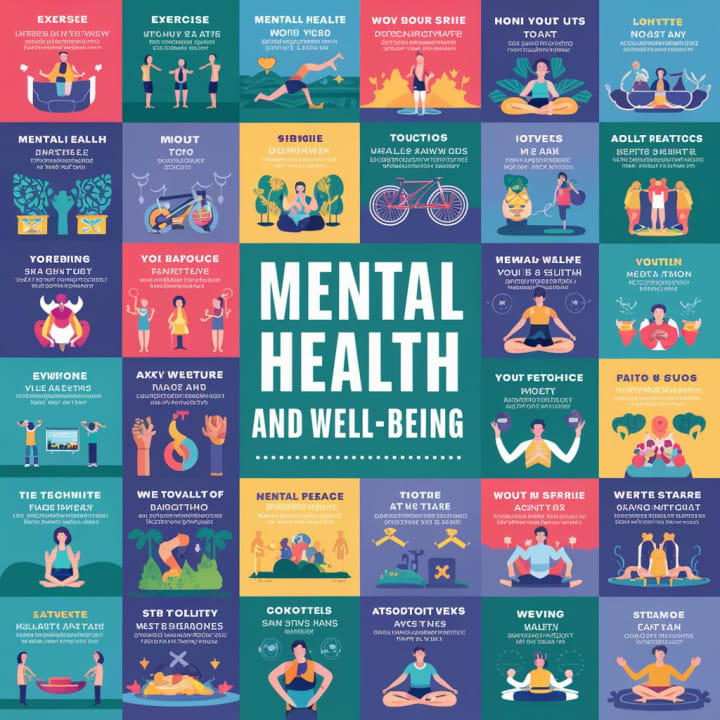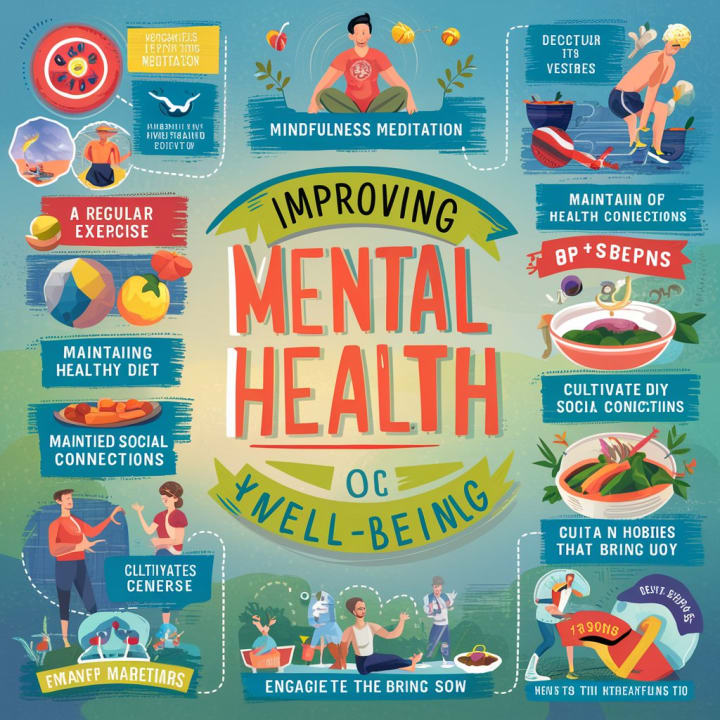How to Improve Your Mental Health and Well-being
Practical Tips for a Happier, Healthier Life

In today's fast-paced world, maintaining good mental health and well-being is crucial for leading a fulfilling life. Our mental health affects how we think, feel, and act, influencing every aspect of our daily lives.
This comprehensive, SEO-optimized guide will provide practical tips to improve your mental health and well-being, helping you achieve a happier, healthier life.
Understanding Mental Health and Well-being
Before diving into the practical tips, it is essential to understand what mental health and well-being encompass. Mental health refers to our emotional, psychological, and social well-being.
It affects how we handle stress, relate to others, and make choices. Well-being, on the other hand, is a broader concept that includes mental, physical, and social health.

Why Mental Health and Well-being Matter
Good mental health and well-being are vital for several reasons:
- Improved Quality of Life: Enhances your overall quality of life and allows you to enjoy everyday activities.
- Better Physical Health: Reduces the risk of physical health problems such as heart disease and chronic pain.
- Stronger Relationships: Helps build and maintain healthy relationships with family, friends, and colleagues.
- Increased Productivity: Boosts your ability to perform at work or school and achieve your goals.
Practical Tips for Improving Mental Health and Well-being
1. Practice Mindfulness and Meditation
Mindfulness and meditation are powerful tools for improving mental health. These practices involve focusing your attention on the present moment, reducing stress, and enhancing self-awareness.
How to Practice Mindfulness:
- Mindful Breathing: Spend a few minutes each day focusing on your breath. Pay attention to the sensation of air entering and leaving your lungs.
- Body Scan: Slowly move your attention through different parts of your body, noticing any tension or discomfort.
- Mindful Eating: Savor each bite of your meal, paying attention to the flavors, textures, and aromas.
Benefits of Meditation:
- Reduces Stress: Lowers cortisol levels, the hormone associated with stress.
- Improves Focus: Enhances concentration and cognitive function.
- Promotes Emotional Health: Increases positive emotions and decreases symptoms of depression and anxiety.

2. Stay Physically Active
Regular physical activity is essential for maintaining good mental health and well-being. Exercise releases endorphins, which are natural mood lifters, and helps reduce symptoms of depression and anxiety.
Types of Physical Activity:
- Aerobic Exercise: Activities like running, swimming, and cycling boost cardiovascular health and release endorphins.
- Strength Training: Lifting weights or doing bodyweight exercises improves physical strength and self-esteem.
- Yoga and Pilates: These practices combine physical movement with mindfulness, reducing stress and promoting relaxation.
Tips for Staying Active:
- Set Realistic Goals: Start with small, achievable goals and gradually increase your activity level.
- Find Activities You Enjoy: Choose exercises that you find enjoyable to stay motivated.
- Make It Social: Join a fitness class or exercise with a friend to stay accountable and make it more fun.

3. Maintain a Healthy Diet
Nutrition plays a crucial role in mental health. A balanced diet provides the necessary nutrients for brain function and overall well-being.
Key Nutrients for Mental Health:
- Omega-3 Fatty Acids: Found in fatty fish, flaxseeds, and walnuts, these support brain health and reduce inflammation.
- B Vitamins: Present in whole grains, eggs, and leafy greens, B vitamins help regulate mood and energy levels.
- Antioxidants: Berries, nuts, and dark chocolate are rich in antioxidants, protecting brain cells from damage.
Healthy Eating Tips:
- Eat Regular Meals: Maintain stable blood sugar levels by eating regular, balanced meals.
- Hydrate: Drink plenty of water throughout the day to stay hydrated and support brain function.
- Limit Processed Foods: Reduce the intake of sugary, fatty, and processed foods, which can negatively affect mood.

4. Build and Maintain Strong Relationships
Healthy relationships are fundamental to mental well-being. They provide emotional support, reduce stress, and increase feelings of belonging.
How to Build Strong Relationships:
- Communicate Openly: Share your thoughts and feelings with friends and family members.
- Be Present: Give your full attention during interactions and practice active listening.
- Show Appreciation: Express gratitude and appreciation for the people in your life.
Tips for Maintaining Relationships:
- Stay Connected: Regularly check in with loved ones, even if it's just a quick message or phone call.
- Resolve Conflicts: Address disagreements constructively and seek to understand the other person's perspective.
- Support Each Other: Offer and seek support during challenging times.
5. Manage Stress Effectively
Stress is a natural part of life, but chronic stress can negatively impact mental health. Developing effective stress management techniques is essential for maintaining well-being.
Stress Management Techniques:
- Time Management: Prioritize tasks, set realistic goals, and break large projects into manageable steps.
- Relaxation Techniques: Practice deep breathing, progressive muscle relaxation, or guided imagery to calm your mind.
- Hobbies and Interests: Engage in activities that you enjoy and that help you relax, such as reading, gardening, or crafting.
Tips for Reducing Stress:
- Set Boundaries: Learn to say no and set limits to prevent overwhelm.
- Take Breaks: Schedule regular breaks throughout the day to rest and recharge.
- Seek Professional Help: If stress becomes unmanageable, consider talking to a mental health professional.

6. Get Enough Sleep
Sleep is essential for mental health and well-being. Poor sleep can lead to increased stress, anxiety, and depression, while good sleep improves mood, concentration, and overall health.
Tips for Better Sleep:
- Maintain a Routine: Go to bed and wake up at the same time every day, even on weekends.
- Create a Relaxing Environment: Keep your bedroom cool, dark, and quiet, and invest in a comfortable mattress and pillows.
- Limit Screen Time: Avoid screens for at least an hour before bed to reduce exposure to blue light, which can interfere with sleep.
Healthy Sleep Habits:
- Wind Down: Establish a bedtime routine that includes relaxing activities like reading or taking a warm bath.
- Avoid Stimulants: Limit caffeine and alcohol intake, especially in the hours leading up to bedtime.
- Exercise Regularly: Physical activity can promote better sleep, but avoid vigorous exercise close to bedtime.
7. Seek Professional Help When Needed
There is no shame in seeking help from a mental health professional. Therapy and counseling can provide valuable support, guidance, and tools for managing mental health challenges.
Types of Mental Health Professionals:
- Psychiatrists: Medical doctors who can prescribe medication and provide therapy.
- Psychologists: Specialists in mental health who provide therapy and counseling.
- Licensed Counselors: Professionals trained to offer support and guidance through talk therapy.
When to Seek Help:
- Persistent Symptoms: If you experience persistent feelings of sadness, anxiety, or hopelessness.
- Impact on Daily Life: When mental health issues interfere with your ability to function at work, school, or in relationships.
- Lack of Improvement: If self-help strategies are not enough to improve your mental health.

8. Practice Self-Compassion
Being kind to yourself is crucial for mental well-being. Self-compassion involves treating yourself with the same kindness and understanding that you would offer a friend.
How to Practice Self-Compassion:
- Acknowledge Your Feelings: Recognize and validate your emotions without judgment.
- Be Kind to Yourself: Speak to yourself in a supportive and encouraging way.
- Forgive Yourself: Accept that everyone makes mistakes and learn from them rather than dwelling on them.
Benefits of Self-Compassion:
- Reduced Stress: Lowers levels of stress and anxiety.
- Improved Resilience: Helps you bounce back from setbacks more effectively.
- Increased Happiness: Promotes a positive self-image and overall happiness.

Conclusion
Improving your mental health and well-being is an ongoing journey that requires dedication and practice. By incorporating these practical tips into your daily life, you can enhance your mental well-being, reduce stress, and lead a happier, healthier life.
Remember, it's important to be patient with yourself and seek professional help when needed.
#MentalHealth, #WellBeing, #Mindfulness, #Meditation, #Exercise, #HealthyEating, #StrongRelationships, #StressManagement, #BetterSleep, #SelfCompassion
About the Creator
Sherif Saad
Hey there, fellow word enthusiasts! I'm Sherif, and I'm thrilled to embark on this creative journey with you
I'm a passionate writer with a love for storytelling that knows no bounds diving into the world of words.
Enjoyed the story? Support the Creator.
Subscribe for free to receive all their stories in your feed. You could also pledge your support or give them a one-off tip, letting them know you appreciate their work.






Comments (3)
You have provided a wealth of practical and valuable advice for anyone looking to enhance their mental and emotional wellness.......The tips you offer are both sensible and achievable....The clear, concise writing style ....makes everyone accessible and engaging, making it a valuable resource for anyone looking to take control of their ....mental health and live a happier, ...healthier life. 👍. Fantastic job
beautiful
This approach ensures that the information shared is not only informative but also empowers individuals to make meaningful changes in their lives, this content is a valuable addition to the growing resources available for those seeking to prioritize their mental health and well-being, thank you for sharing!